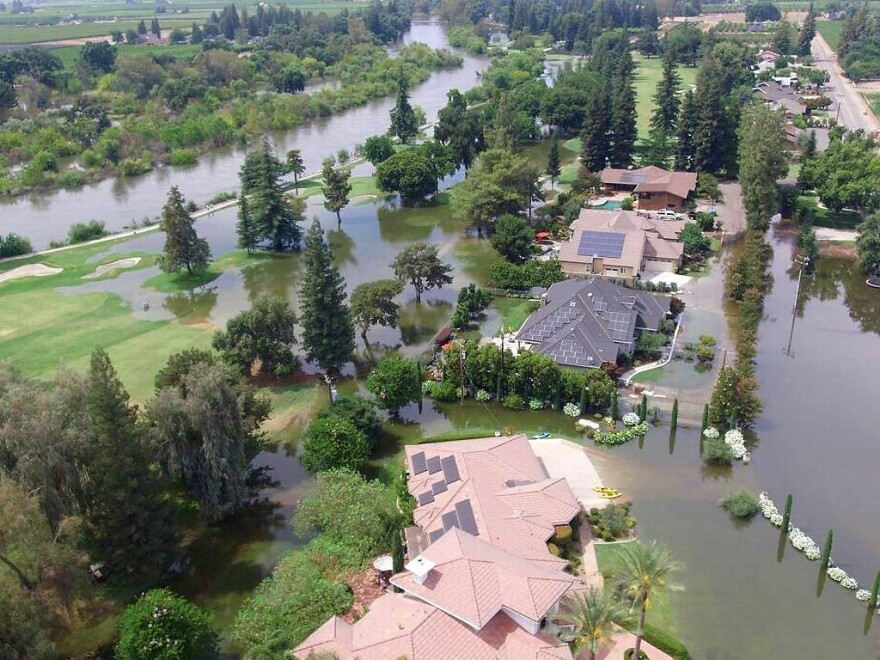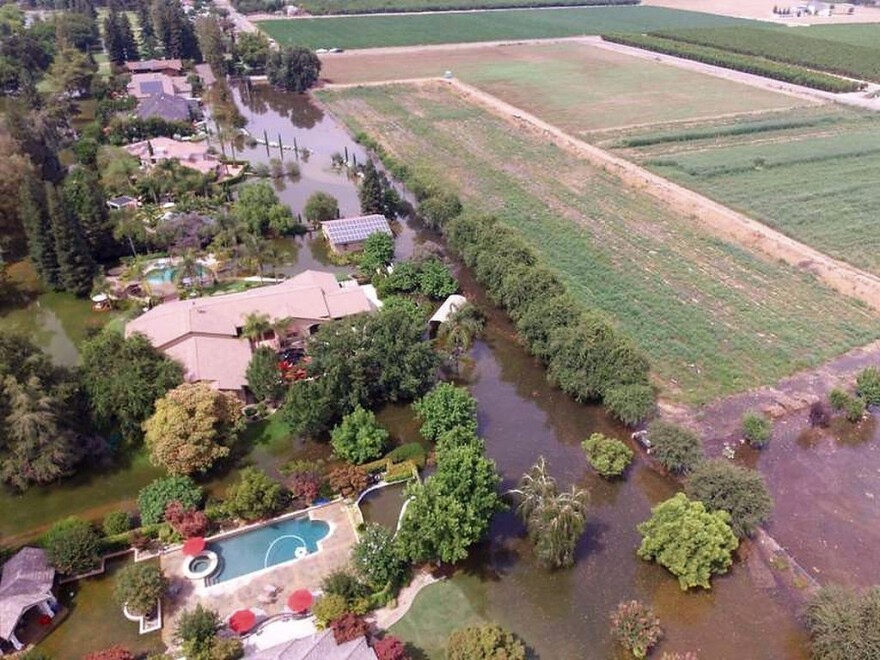With our free press under threat and federal funding for public media gone, your support matters more than ever. Help keep the LAist newsroom strong, become a monthly member or increase your support today .
$27 million later, the LA Snowpack Emergency of 2017 is over
The emergency that Los Angeles declared last spring to prevent flooding and damage from a near-record Sierra snowpack is over, Mayor Eric Garcetti has declared.
The city spent $27 million to reduce the risk that homes and roads could be flooded and that the Los Angeles Aqueduct could be blocked with silt and damaged. The money also went to prevent flood damage to more than $1 billion worth of pipes, pumps, berms and plants installed on the Owens Dry Lake to reduce dust and air pollution.
In normal years, the city gets a good portion of its water from melted snow in the Eastern Sierra, channeled south on the 200-mile Los Angeles Aqueduct. Over five years of drought, the aqueduct carried very little water to L.A., but the last winter's snows changed that. The snowpack on the Eastern Sierra was 203 percent of a normal year, and was the second largest recorded, after the 1969 snowfall.

Suddenly, the city's Department of Water and Power was facing the prospect of being able to get twice a normal year's water supply from its century-old aqueduct.
But the surplus of water carried other risks, and by declaring the emergency in March, before the snow began melting, the city was able to get out ahead of the surplus with a lot of maintenance and repair work, said Jim Yannotta, assistant director of DWP's Northern District, which includes the aqueduct. The amount of water coming from the melting snow peaked in June, he said.
The money paid for work that might be done by other agencies, he told the DWP Board of Commissioners in July. For example, the DWP replaced a Caltrans culvert running under Highway 395 because there were indications the heavy snowmelt could undermine the road.
DWP crews also used excavating equipment to clear rocks and silt, keeping streams flowing in their channels where they might otherwise overtop their banks and flood homes and property. Measures were taken to keep Crowley Lake from spilling water into an area where it could have harmed an endangered species of fish.
The snow melt could have put as much as 200,000 acre feet of water into the Owens Dry Lake bed, damaging the dust reduction pipes, pumps, berms and vegetation installed to keep air pollution down. The work to re-direct the water away from those elements kept the amount of water flow into the lakebed to just 15,000 acre feet. The DWP lost about 5 percent of its dust control capacity due to the excess water.

The emergency declaration also enabled the work to be done faster, speeding permissions from such landowners as the Bureau of Land Management and the U.S. Forest Service, Yannotta said.
The DWP also increased the amount of water it spread in the Owens River Basin, raising the groundwater level there by nine feet. The money covered extra work to clear canals and lower water reservoir levels along the Aqueduct, making room for the runoff.

Closer to home, the money paid for work to recover and change the use of the long-defunct Maclay Highline. It is a pipe that originally carried water from the end of the aqueduct in Sylmar to an open-air reservoir, but it fell out of use a decade ago. It was revamped to carry water from the aqueduct to a spreading ground in Pacoima. Previously, the DWP had no means of moving excess water from the aqueduct to recharge groundwater.
DPW used aqueduct water in Los Angeles in place of more costly water imported from the Colorado River. A spokesman for the DWP could not immediately say how much the excess water saved ratepayers on their water bills.
At LAist, we believe in journalism without censorship and the right of a free press to speak truth to those in power. Our hard-hitting watchdog reporting on local government, climate, and the ongoing housing and homelessness crisis is trustworthy, independent and freely accessible to everyone thanks to the support of readers like you.
But the game has changed: Congress voted to eliminate funding for public media across the country. Here at LAist that means a loss of $1.7 million in our budget every year. We want to assure you that despite growing threats to free press and free speech, LAist will remain a voice you know and trust. Speaking frankly, the amount of reader support we receive will help determine how strong of a newsroom we are going forward to cover the important news in our community.
We’re asking you to stand up for independent reporting that will not be silenced. With more individuals like you supporting this public service, we can continue to provide essential coverage for Southern Californians that you can’t find anywhere else. Become a monthly member today to help sustain this mission.
Thank you for your generous support and belief in the value of independent news.

-
Immigration raids have caused some U.S. citizens to carry their passports to the store, to school or to work. But what documents to have on you depends on your citizenship.
-
The historic properties have been sitting vacant for decades and were put on the market as-is, with prices ranging from $750,000 to $1.75 million.
-
Users of the century old Long Beach wooden boardwalk give these suggestions to safely enjoy it.
-
The Newport Beach City Council approved a new artificial surf park that will replace part of an aging golf course.
-
The utility, whose equipment is believed to have sparked the Eaton Fire, says payouts could come as quickly as four months after people submit a claim. But accepting the money means you'll have to forego any lawsuits.
-
The City Council will vote Tuesday on a proposal to study raising the pay for construction workers on apartments with at least 10 units and up to 85 feet high.











